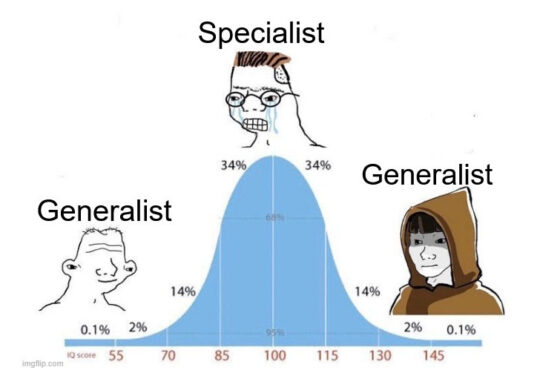
How To Turn “Wasted Time” Into Leverage: Lessons From Newton’s Alchemy
When Your Efforts Feel Wasted
We’ve all had seasons of life that feel wasted.
- A degree that didn’t lead to the career you expected.
- A business idea that fizzled.
- Years spent chasing meaning in the wrong places.
On the surface, these pursuits look like detours. At worst, they look like regrets.
But what if those detours aren’t wasted at all?
What if they’re catalysts? What if the chaos of them births emergent properties you couldn’t predict?
Take Isaac Newton. The man we celebrate for gravity and calculus spent decades buried in alchemy, a pursuit modern science would call pseudoscience. If you judged him by that metric, you’d say the greatest genius of the Scientific Revolution wasted much of his prime on fool’s gold.
But the truth is more nuanced. Newton’s “wasted” alchemy years gave him habits, frameworks, and insights that fed directly into the breakthroughs that changed the world.
Your own “wasted years” can do the same, if you know how to extract the lessons.
The Pain of Looking Back
Think about how this lands on your life:
- Maybe you’ve studied something deeply only to later abandon it.
- Maybe you’ve poured time into relationships, communities, or belief systems that no longer hold meaning for you.
- Maybe you’ve chased opportunities that collapsed, leaving you feeling behind.
It’s easy to call that wasted time.
I know this feeling personally. I spent years deeply engaged in a pursuit that once felt central to my life. Over time, I came to different conclusions than I started with. At first, I thought: I wasted years.
But through reflection, I realized something: what I gained was not the “answer” I expected, but the mental muscles I built along the way: precision reading, narrative analysis, critical thought, persistence. Skills I now apply to entirely different areas, like web development, psychology, and exploring universal principles.
The point isn’t whether the subject was “right” or “wrong.” The point is that the byproducts were valuable.
And Newton’s story proves this principle on the grandest scale.
How Newton’s Alchemy Reveals the Hidden Value of Failure
Let’s reframe Newton’s alchemy with mental models to illustrate the universal principles involved.
1. Inertia: Why Newton Couldn’t Easily Avoid Alchemy
The mental model of inertia explains momentum: objects in motion stay in motion unless acted upon by an outside force.
Newton’s intellectual world was already in motion toward alchemy. In the 1600s, alchemy wasn’t fringe, it was part of the mainstream frontier of knowledge. It promised answers to the deepest mysteries: What is matter made of? Can it be transformed? Can we unlock hidden forces of nature?
The payoff looked infinite: eternal life, unlimited wealth, mastery of matter. The expected value was enormous, even if the odds were low.
For someone with Newton’s obsessive curiosity, not pursuing alchemy would have been like asking a rocket to stop mid-flight. The cultural, intellectual, and psychological inertia was too strong.
So judging Newton for wasting time on alchemy is like judging a fish for swimming. It was the medium he lived in.
2. Catalyst: How Alchemy Sparked Transformation
Here’s where the first key model comes in: catalyst.
A catalyst is something that triggers transformation without being consumed itself. Alchemy never produced the Philosopher’s Stone, but it catalyzed Newton’s habits of experimentation:
- Mixing chemicals in the lab gave him hands-on familiarity with reactions and conservation principles.
- Recording results instilled scientific rigor.
- Searching for hidden patterns trained him to think systematically about unseen forces.
Alchemy didn’t survive as a valid science, but the mindset it ignited in Newton did.
3. Emergence: How Value Arises From Chaos
The second model is emergence, the phenomenon where complex systems produce unexpected properties that aren’t obvious from their parts.
Newton’s thousands of pages of alchemical notes look chaotic. But from that chaos emerged:
- A pattern-seeking mind.
- The discipline of cross-referencing and connecting disparate ideas.
- A belief that unseen forces could explain observable reality.
Gravity itself can be seen as an emergent insight from the stew of Newton’s obsessions. He was already trained to imagine invisible structures behind the visible world.
Alchemy failed at its stated goal, but it birthed emergent properties that equipped Newton to revolutionize science.
4. Second-Order Effects: The Hidden Payoffs
The second-order effect of alchemy wasn’t gold or immortality. It was Newton’s intellectual training ground.
- First-order effect: wasted years in a dead-end field.
- Second-order effect: new skills, new ways of thinking, cross-domain insights, similar to the cross-domain learning described in the book Range by David Epstein.
This is the key: what looks wasted at the first-order level often pays dividends at the second-order level.
Applying This To Your Life
Now, let’s extract the principle for us: how to handle pursuits that feel wasted.
Step 1: Identify Latent Value
Ask: What skills, habits, or perspectives did I gain from this pursuit, even if the subject turned out to be a dead end?
For me, one of my past pursuits built:
- Close reading and pattern recognition.
- Ability to connect abstract concepts into narratives.
- Comfort with complexity and contradictions.
For you, it could be discipline from sports, communication from sales, or resilience from failed startups.
Step 2: Reframe as Training
Instead of saying “I wasted those years,” say: “That was my boot camp.”
Newton’s alchemy was his laboratory boot camp. My earlier years of study were my critical thinking boot camp. Yours might be your entrepreneurial, relational, or creative boot camp.
Step 3: Translate Into Leverage
Take the byproducts and ask: Where can I apply this now?
- Newton applied his lab discipline to physics.
- I apply my textual analysis to writing and frameworks.
- You might apply your failed business lessons to spotting better opportunities.
The leverage isn’t in the pursuit itself, it’s in how you redeploy the byproducts.
Step 4: Integrate Into Identity
The final step is to own it.
Newton didn’t erase his alchemical notebooks. He integrated that chapter into the broader arc of his life. For us, the same rule applies.
Instead of hiding your “wasted” years, you weave them into your story: “That’s where I built the muscles I use today.”
Key Principles
- Inertia: Don’t judge yourself too harshly for past pursuits. You were swimming in the currents of your time and personality.
- Catalyst: Even failed pursuits can trigger transformative habits and mindsets.
- Emergence: Unexpected value can arise from messy or chaotic processes.
- Second-Order Effects: The hidden payoff often matters more than the direct result.
- Leverage: A “wasted” pursuit reframed as training becomes leverage.
Key Takeaways
- Newton’s alchemy was not a waste, it was a catalyst and training ground that gave rise to emergent insights.
- It would have been nearly impossible for him not to pursue alchemy, given the inertia of his time and his own personality.
- Your own “wasted” pursuits contain second-order effects you can harness.
- The process is simple: Identify latent value → Reframe as training → Translate into leverage → Integrate into identity.
- The point is not to avoid all detours. The point is to ensure you extract the emergent value from every path you take.
Final Thought:
If Newton’s “wasted” decades helped him write the Principia, the foundation of modern physics, maybe your “wasted” years aren’t wasted at all.
They’re the raw material for your breakthroughs.
Thanks for reading my stuff,
MJ




